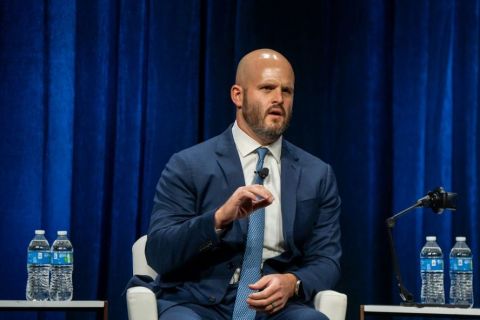Oil, gas and related stocks' recent strength, relative to the general market, stems more from favorable underlying fundamentals than investor disenchantment with other businesses, according to market observers. Concerns over terrorism are responsible for about 30% of the general market weakness, and investor skeptism accounts for the other 70%, says Diane Swonk, chief economist at Bank One. "Actually, the market has withstood all of this surprisingly well. Profits actually are improving. We're just not sure how to count them. It's not a bad economy, and certainly a heck of a lot better than a year ago. The problem is that no one is certain how much better because they can't put a number on it." John C. Felmy, chief economist for the American Petroleum Institute, says major oil stocks' price- to-earnings ratios have been in the lower 20% range recently, a decent level compared with the rest of the market. This is primarily a function of oil prices and the world's supply-and-demand situation, he adds. "These companies produce real products. They have real assets. And they have been delivering profits for their shareholders. They also face real challenges," Felmy says. Al Silber, who follows the majors for Monness, Krespi, Hardt & Co., New York, says, "The sense of the investor is that Middle East oil is precariously positioned, and the Bush administration seems bent on doing something in Iraq. Institutional investors seem fearful of dumping the oils, despite the current price situation, because of what could happen if the U.S. moves against Iraq. Gas is not terribly secure either, particularly since it's increasingly tied to oil. The question is whether it's a long-term trend, or whether prices will correct once the Middle East settles down." He warns that strong oil-demand growth is not necessarily a foregone conclusion. "Overproduction within OPEC is climbing. Russia still represents a wild card, and some additions in the Caspian Basin could bring more non-OPEC oil onto the market. Increasing natural gas use is backing out demand for oil," Silber says. "The other side of the coin is that investment in OPEC production has dropped. There also is some potential that the supply situation could grow tighter, particularly as Far East demand comes back." Felmy thinks investors are right to be wary of world oil prices that might be inflated by war premiums. "They're not a good long-term proposition, unlike supply and demand. OPEC has maintained its quotas, although there's some indication of up to 1.5 million barrels per day of overproduction. Then there's the question of demand. The U.S. economy is moving along, but it doesn't seem particularly robust. Worldwide, the dollar is weak, which will help our economy and hurt those of our trading partners." Swonk suggests the domestic economy is stronger than many people think. "The seeds are there for a robust market rally, given low interest rates and rising profits," she says. "We don't need to generate a lot of jobs to keep spending going. Businesses are coming back, with small increases in profits instead of declines. It won't be much longer before inventories will have to be restocked. They're way too low right now." She notes that when WorldCom Inc. disclosed that it had overstated its earnings by $3.8 billion, the market pretty much came back by the closing bell. "That was surprising. We're not done with the shakeout, however. It's no surprise that the market's best day the last three weeks was the day after Arthur Andersen LLC was found guilty. Investors just want to figure things out. Until they're certain about what happens to CEOs who defraud investors, they're not going to be happy."
Recommended Reading
Baker Hughes Awarded Saudi Pipeline Technology Contract
2024-04-23 - Baker Hughes will supply centrifugal compressors for Saudi Arabia’s new pipeline system, which aims to increase gas distribution across the kingdom and reduce carbon emissions
TechnipFMC Eyes $30B in Subsea Orders by 2025
2024-02-23 - TechnipFMC is capitalizing on an industry shift in spending to offshore projects from land projects.
Patterson-UTI Braces for Activity ‘Pause’ After E&P Consolidations
2024-02-19 - Patterson-UTI saw net income rebound from 2022 and CEO Andy Hendricks says the company is well positioned following a wave of E&P consolidations that may slow activity.
ProPetro Reports Material Weakness in Financial Reporting Controls
2024-03-14 - ProPetro identified a material weakness in internal controls over financial reporting, the oilfield services firm said in a filing.
Kimmeridge Fast Forwards on SilverBow with Takeover Bid
2024-03-13 - Investment firm Kimmeridge Energy Management, which first asked for additional SilverBow Resources board seats, has followed up with a buyout offer. A deal would make a nearly 1 Bcfe/d Eagle Ford pureplay.





